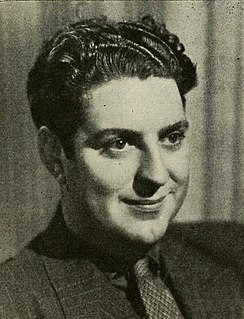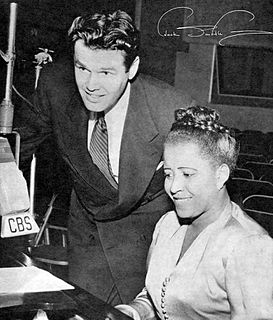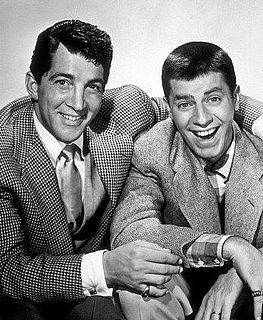Related Research Articles

Orvon Grover "Gene" Autry, nicknamed the Singing Cowboy, was an American singer, songwriter, actor, musician, rodeo performer, and baseball owner who gained fame largely by singing in a crooning style on radio, in films, and on television for more than three decades beginning in the early 1930s. Autry was the owner of a television station, several radio stations in Southern California, and the Los Angeles/California Angels Major League Baseball team from 1961 to 1997.

Roy Rogers was an American singer, actor, and television host. Following early work under his given name, first as co-founder of the Sons of the Pioneers and then acting, the rebranded Rogers then became one of the most popular Western stars of his era. Known as the "King of the Cowboys", he appeared in over 100 films and numerous radio and television episodes of The Roy Rogers Show. In many of his films and television episodes, he appeared with his wife, Dale Evans; his Golden Palomino, Trigger; and his German Shepherd, Bullet. His show was broadcast on radio for nine years and then on television from 1951 through 1957. His early roles were uncredited parts in films by fellow cowboy singing star Gene Autry and his productions usually featured a sidekick, often Pat Brady, Andy Devine, George "Gabby" Hayes, or Smiley Burnette. In his later years, he lent his name to the franchise chain of Roy Rogers Restaurants.

Woodward Maurice "Tex" Ritter was an American country music singer and actor popular from the mid 1930s into the 1960s, and the patriarch of the Ritter acting family. He is a member of the Country Music Hall of Fame.

Hopalong Cassidy or Hop-along Cassidy is a fictional cowboy hero created in 1904 by the author Clarence E. Mulford, who wrote a series of short stories and novels based on the character.

Bob Nolan was a Canadian-born American singer, songwriter, and actor. He was a founding member of the Sons of the Pioneers, and composer of numerous Country music and Western music songs, including the standards "Cool Water" and "Tumbling Tumbleweeds." He is generally regarded as one of the finest Western songwriters of all time. As an actor and singer he appeared in scores of Western films.

Lester Alvin Burnett, better known as Smiley Burnette, was an American country music performer and a comedic actor in Western films and on radio and TV, playing sidekick to Gene Autry, Roy Rogers, and other B-movie cowboys. He was also a prolific singer-songwriter who is reported to have played proficiently over 100 musical instruments, sometimes more than one simultaneously. His career, beginning in 1934, spanned four decades, including a regular role on CBS-TV's Petticoat Junction in the 1960s.
"Back in the Saddle Again" was the signature song of American cowboy entertainer Gene Autry. It was co-written by Autry with Ray Whitley and first released in 1939. The song was associated with Autry throughout his career and was used as the name of Autry's autobiography in 1976. Members of the Western Writers of America chose it as fifth of the Top 100 Western songs of all time.

Jimmy Wakely was an American actor, songwriter, country music vocalist, and one of the last singing cowboys. During the 1930s, 1940s and 1950s, he released records, appeared in several B-Western movies with most of the major studios, appeared on radio and television and even had his own series of comic books. His duet singles with Margaret Whiting from 1949 until 1951, produced a string of top seven hits, including 1949's number one hit on the US country chart and pop music chart, "Slippin' Around". Wakely owned two music publishing companies in later years, and performed at the Grand Ole Opry until shortly before his death.

Shell Chateau was a musical variety radio series heard on NBC from April 6, 1935 to June 26, 1937. Sponsored by Shell Oil, the hour-long program, sometimes called The Shell Show, was broadcast on Saturday evenings at 9:30pm.

Gene Autry's Melody Ranch is a Western variety radio show in the United States. A 15-minute pilot show aired on December 31, 1939. The program ran from January 7, 1940 to August 1, 1943, and from September 23, 1945 to May 16, 1956. The show's entire run was broadcast over the CBS radio network, sponsored by Doublemint gum. The approximately two-year interruption resulted from Autry's enlistment in the United States Army to serve in World War II. Initially titled Doublemint's Melody Ranch, the show's name was changed to Gene Autry's Melody Ranch in early 1941. Episodes were 30 minutes long except for a 15-minute version that ran from September 23, 1945 to June 16, 1946. The theme song was "Back in the Saddle Again".
Hollywood Hotel is an American radio program that was broadcast in the 1930s. It featured Hollywood stars in dramatized versions of then-current movies and "helped to make Hollywood an origination point for major radio programs." Radio historian John Dunning called the program, sponsored by Campbell Soup Company, "the most glamorous show of its time." The program was the inspiration for the 1937 Warner Brothers movie of the same title, which featured Louella Parsons as herself.
The Saint was a radio adventure program in the United States that featured a character created by author Leslie Charteris. As the program's introduction said, The Saint, was "known to millions from books, magazines, and motion pictures." Several versions of the program appeared on different networks.

The Jack Smith Show was a radio program of popular music in the United States. It was broadcast on CBS Aug. 21, 1945-Dec. 26, 1952. It first originated from New York, but production was moved to Hollywood in 1948 to allow more opportunities for Smith to work in movies.

The Martin and Lewis Show was a radio comedy-variety program in the United States starring Dean Martin and Jerry Lewis. It was broadcast on the NBC Radio Network beginning April 3, 1949, and ending July 14, 1953.
The Cresta Blanca Hollywood Players was a dramatic anthology series on radio in the United States. It was broadcast on CBS September 3, 1946 – February 26, 1947.
Mayor of the Town is a radio comedy-drama in the United States. From September 6, 1942, to July 3, 1949, it was broadcast at various times on ABC, CBS, Mutual and NBC.
For the interview program of the same name, see Hollywood Star Time .
Hopalong Cassidy is a radio western in the United States, featuring the character Hopalong Cassidy created by writer Clarence E. Mulford. It was syndicated via electrical transcription, beginning in 1948 and continuing into 1950. Its network broadcasts began on Mutual January 1, 1950, and ended on CBS December 27, 1952.

Granby's Green Acres is a radio situation comedy from the United States. It was broadcast on CBS July 3, 1950 – August 21, 1950, as a summer replacement for Lux Radio Theatre.
Hallmark Playhouse is an American old-time radio dramatic anthology series. It was broadcast on CBS from June 10, 1948 until February 1, 1953, and was described by one author as "a program that consistently produced the highest levels of production quality and value." Beginning on February 8, 1953, the program underwent changes of title, host, and format. It was broadcast as The Hallmark Hall of Fame until March 27, 1955, still on CBS.
References
- ↑ Phillips, Robert W. (1995). Roy Rogers: A Biography, Radio History, Television Career Chronicle, Discography, Filmography, Comicography, Merchandising and Advertising History, Collectibles Description, Bibliography and Index. McFarland & Company, Inc. ISBN 0-89950-937-1. Pp. 75-79.
- ↑ Price, Deborah Evans (July 18, 1998). "Trailblazer Roy Rogers, 86, Dies". Billboard. Vol. 110 no. 29. p. 92. Retrieved 3 May 2014.
- ↑ French, Jack; Siegel, David S. (2013). Radio Rides the Range: A Reference Guide to Western Drama on the Air, 1929–1967. McFarland. p. 159. ISBN 9781476612546 . Retrieved 20 April 2018.
- 1 2 Dunning, John. (1976). Tune in Yesterday: The Ultimate Encyclopedia of Old-Time Radio, 1925-1976. Prentice-Hall, Inc. ISBN 0-13-932616-2. Pp. 525-527.
- ↑ Wood, Gerry (August 16, 1986). "Nashville Scene". Billboard. Vol. 98 no. 33. p. 32. Retrieved 3 May 2014.
- ↑ "Roy Rogers". Country Music Hall of Fame. Retrieved 3 May 2014.
- ↑ Rogers, John (May 22, 1999). "Company releases box set in tribute to Roy Rogers". The Fort Scott Tribune. Retrieved 3 May 2014.
- ↑ "Vitrue Always Triumphs Over Evil As Roy Rogers Rides On". Wilmington Sunday Star. April 4, 1954. Retrieved 3 May 2014.
- ↑ Reinehr, Robert C. and Swartz, Jon D. (2008). The A to Z of Old Time Radio. Scarecrow Press, Inc. ISBN 978-0-8108-7616-3. Pp. 224-225.
- ↑ Terrace, Vincent (1981), Radio's Golden Years: The Encyclopedia of Radio Programs 1930-1960. A.S. Barnes & Company, Inc. ISBN 0-498-02393-1. P. 229.
- ↑ Haendiges, Jerry. "The Roy Rogers Show". Jerry Haendiges Vintage Radio Logs. Retrieved 2 May 2014.
- ↑ "The Roy Rogers Radio Show". Bill and Sue-On Hillman. Retrieved 3 May 2014.